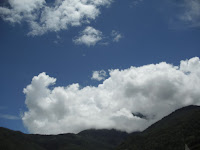 |
| Where to do we strike a balance? |
It is really saddening to hear so many undesired activities happening in the country. Especially this month, we are made to feel that we are living in one violent society. A father killing his child, a series of rapes.
Have we become more violent now? Or is it because our media coverage has increased?
Every time I visit my village, it saddens me to see my fellow villagers' a vast stretch of paddy field covered in thick sands, pebbles and huge boulders. It is been sometime now since the land has remained unfit for cultivation. All these happened one night when a heavy flash flood washed off everything on its way, including houses, cattle, infrastructures, fruits and fodder trees, watermill, irrigation channels, basically everything.
And interesting thing is until now nothing has happened. The regretful incident did not even deserve a paragraph in our media. Many villagers get nightmares when they recall the incident. Of course now someone writing on it would only rub chillies on their healing wounds.
But here, media makes it so big deal even when someone's orange tree has some worms feeding on it. In the remote villages the wild animals destroying our farmers' entire crop go unreported.
Comments
Post a Comment
So what do you think?